Dryer Buying Guide – How To Choose The Best Option For Your Home
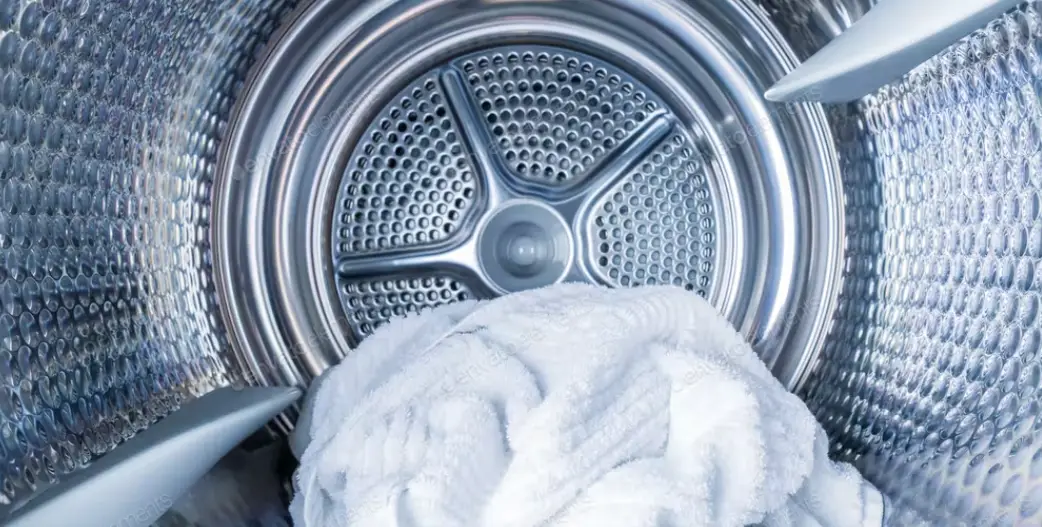
The fact that laundering your clothes is such a mundane chore usually muddles the perception of the appliances themselves.
We tend to think that dryers are boring and pretty much all the same. While that may have been true in the 20th century, that certainly isn’t the case in 2022.
Today, dryers have almost as many features as new cars. Some can be operated via your smartphone while others are built to be as energy efficient as possible. You have the option of choosing from gas or electric, front loading and top loading.
While all these options are great, they can make it harder to determine which model would work best in your home.
Whether you are buying your first dryer or haven’t been in the market for a long time, we think you’ll find the following guide very helpful.
In it we will be taking an exhaustive look at all the options you have available to you, what you need to consider when buying a new drier and address some of the most commonly asked questions about these appliances.
Let’s get started!
Things you Need to Consider When Buying A Dryer
Buying the right dryer rarely comes down to how nice a dryer looks.
If you want the best dryer for practical use you will have to consider the laundering needs of you and your family. You should also take into consideration how energy efficient the model is.
Another important factor to consider is the capacity of the drier. Let’s take a closer look at what you need to consider when buying a drier:
Capacity
The capacity of a drier will most commonly be measured in cubic feet. This refers to how much internal space there is in the drier drum.
If you typically like to wash and dry larger loads, you may want to consider buying a large-capacity dryer (generally about 9 cubic feet or higher).
Size of your Family
If it’s just you and one other person in your household, you may not need a high-capacity dryer. But if you have a large family it would be a good idea to get a large dryer and preferably one that is EnergyStar rated to help you save money.
You will likely be running the dryer a lot of you have a large family and EnergyStar rated dryers can use up to 20% less energy to operate.
Noise
Noise and placement of the dryer sort of go hand in hand. In some households, your common living spaces may be very close to where you need to place your dryer. In this case, you may want a quieter operating dryer.
For larger homes with dedicated rooms or closets for laundering, noise may not be as big an issue. In any case, you should know that dryer noise is measured in decibels and that the average dryer should operate between 56 and 58 decibels (dBA).
Energy Efficiency
Many dryers need to be hooked up to both electricity and your gas line. Older models can be terribly inefficient while newer models tend to be more efficient.
If you use your dryer often (or intend to) it would be wise to try to get an energy-efficient model. Your average electric dryer will use about 800 Kwh per year.
Features
Like most things, you can expect to pay more for a dryer that has a bunch of advanced features.And you may not need all those features anyway. If you grew up using a normal dryer then you can probably live without the ability to activate yours from your phone.
However, new features can be very convenient and may even help with energy efficiency.
Budget
Of course, it all comes back to how much money you are willing/able to spend.These days, you can get a dryer for anywhere between about $400 and $2000 so carefully consider your budget and choose accordingly.
Check Out The Most Affordable Dryers Here:
Types of Dryers
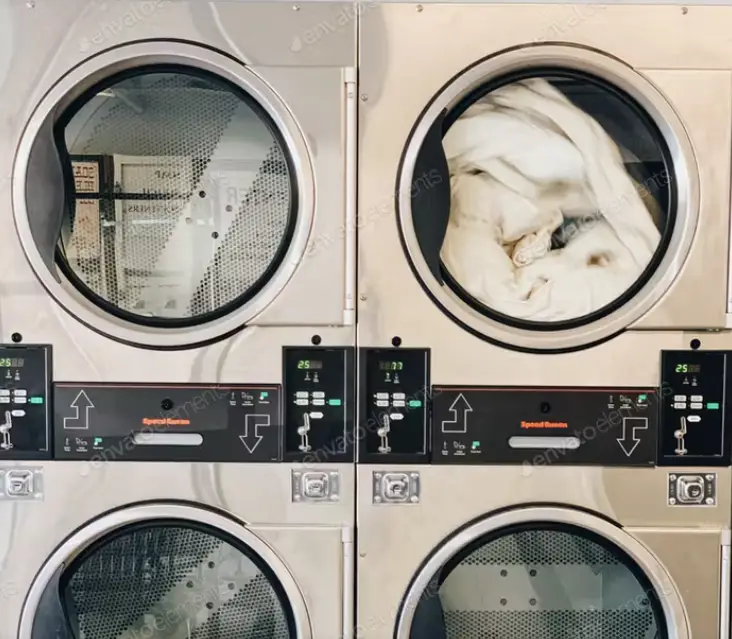
Once you have a good handle on what you need to consider when buying a new dryer, it’s helpful to be aware of the different types and what boxes they check off.
Take a look at the main types of dryers:
Vented Dryer
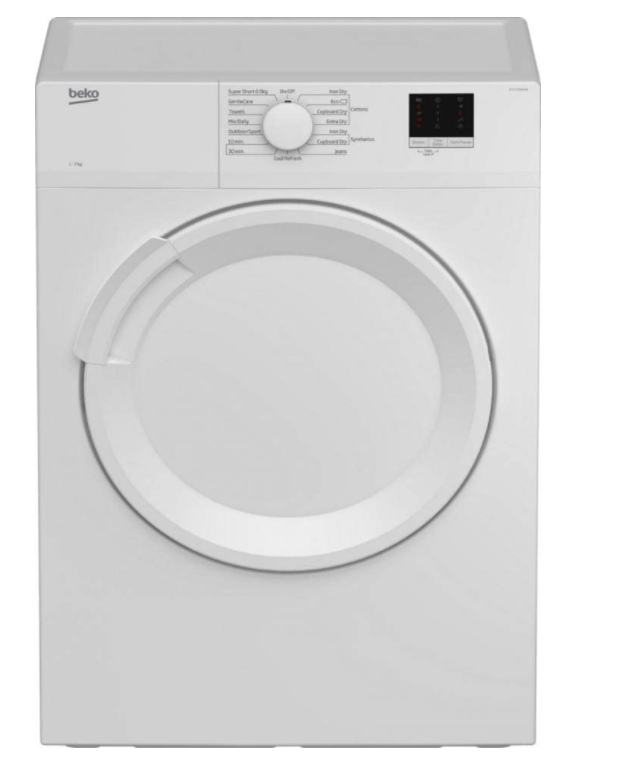
A vented dryer uses a hose to channel the warm and damp air out of the drum. The dryer will have a hose outlet and will need to be installed near a wall or a window.
You can permanently affix a hose between the hose outlet in the dryer and vent outlet in the wall where the air gets channeled outdoors.
Pros:
They Tend to Be More Affordable
Vented dryers are very common and they tend to be some of the most affordable options.
Easy to Hookup
The venting process is very easy and uses a flexible hosing made specifically for dryers that is usually secured with a built-in clamp.
Many Size Options
Vented dryers have been around for a very long time and are available in many different sizes.
Cons:
Prone to Clogging
Depending on how much the hose has to bend to connect between the wall/window and the dryer, it can get clogged with dust and lint.
Older Models
These days, vented dryers tend to be older models that might come with some inherent durability issues.
Vented dryers tend to be a bit more energy efficient than condenser dryers because they can channel humid air straight outdoors and get your clothes dry quicker. They come in a wide variety of sizes so finding the right capacity for your needs should be no problem. Vented dryers are a solid option if your home has good access to ventilation where the dryer is going to be.
Overall Score: 95/100
Condenser Dryer
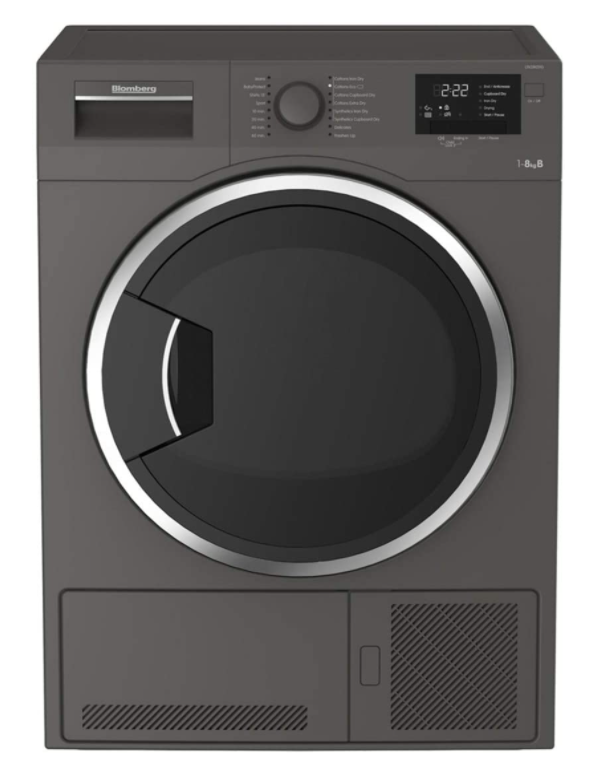
Condenser dryers work by collecting the steam from inside the dryer drum into a reservoir. As the steam builds up, it naturally turns into water. You can then empty the reservoir of the water.
Pros:
No Need for Venting
You don’t have to hook a condenser dryer up to a venting outlet with a dryer hose.
Indicator Lights
Most condenser dryers will have an indicator light to let you know when it’s time to empty the reservoir.
Freedom of Placement
Because these driers don’t need hoses or vent outlets, they can be placed anywhere that has decent natural ventilation.
Cons:
Condensation
If they aren’t placed in a room with decent natural airflow, condensation can form in the room.
Expensive
Not only are these kinds of dryers typically more expensive to buy; they usually cost more to run too.
In general condenser dryers aren’t as efficient as vented dryers. They do come in a wide variety of sizes though so capacity shouldn’t be an issue.
They would work great for anyone who needs to place their dryer in an area that doesn’t have access to vent ports or a window.
Overall Score: 94/100
Heat Pump Dryer
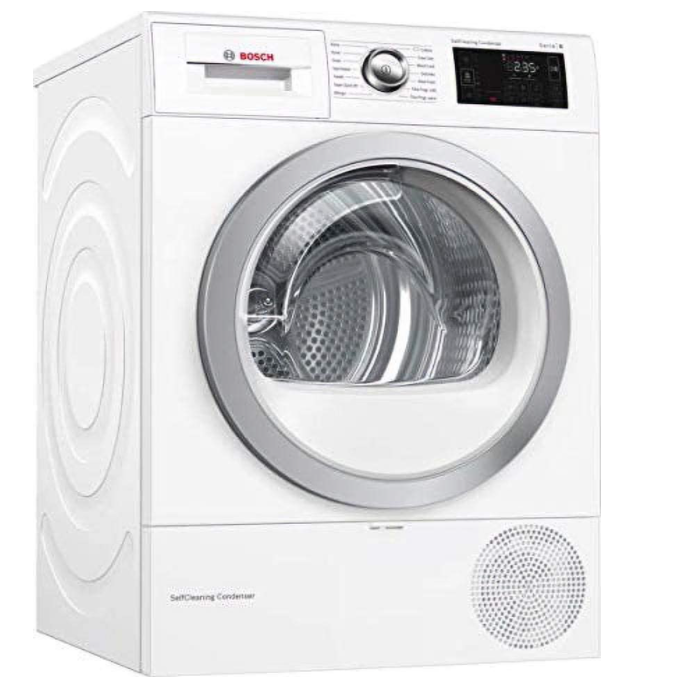
A heat pump dryer uses hot air to remove the moisture from your clothes. The moisture is pump-fed into a tank where it is allowed to evaporate. There are no vents needed and no need to empty a reservoir.
Pros:
Very Energy Efficient
By far, the biggest advantage of these types of dryers is how energy efficient they are. They use about 60% less energy than standard electric dryers.
No Venting Needed
Because these dryers don’t emit any moisture or warm air, venting is not necessary.
Great for Apartments
And because there is no venting necessary, heat pump dryers are great for small apartments.
Cons:
Upfront Cost
Because there are very few US manufacturers that make these dryers, they are still pretty expensive.
Limited Options
These dryers are much more popular in Europe and aren’t made much in the US so models are very limited as of today.
Heat pump dryers are the most efficient – if you can stomach the upfront cost. In fact, if you are in the US you can expect to pay around $1600 for one.
But the long-term energy savings may help compensate. These are great options for people in small apartments or who are more interesting in long-term savings.
Overall Score: 96/100
Gas Dryer
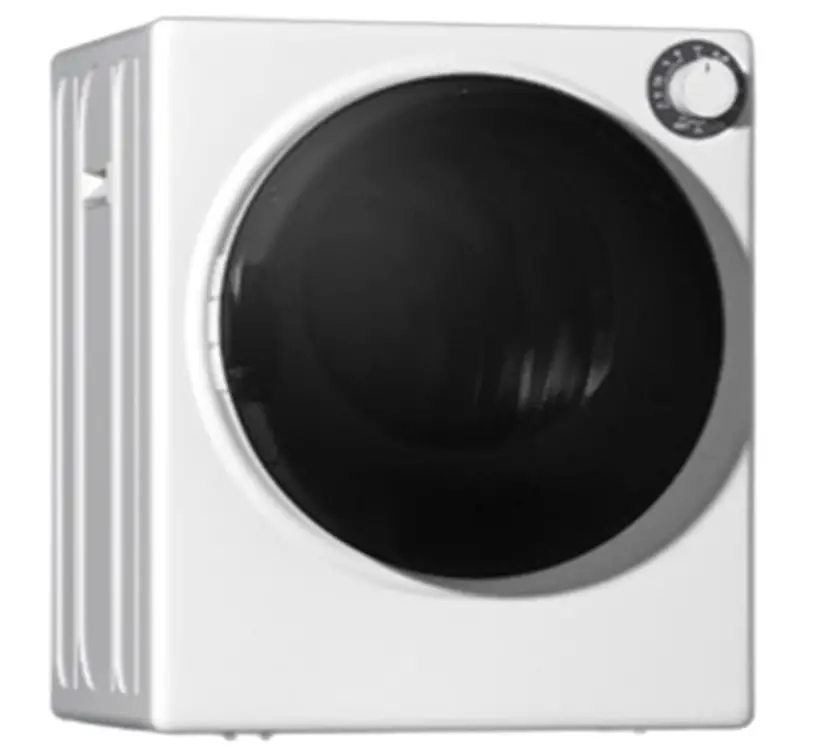
Gas dryers use a combination of gas and electricity. The electricity powers the spinning of the drum while the gas is used to generate heat inside the drum and dry the clothes as they are tumbled.
Pros:
Lower Operating Costs
Depending on where you live, natural gas can be much less expensive than electricity.
Quick Drying
Gas dryers tend to get your clothes dry quicker than comparable electric dryer models.
Less Damage
Electric dryers need to tumble an average as twice as much as gas dryers so gas dryers are easier on your clothes.
Cons:
Requires A Gas Hookup
You may not have a gas hookup in your home so gas dryers wouldn’t even be an option.
Installation Can Be Expensive
If you need a gas hookup installed, the price for the total installation can be very expensive.
By far, the people who would benefit the most from a gas dryer would be people who already have gas hookups in their homes.
They can be compact or high-capacity and are very energy-efficient compared to electric dryers.
Overall Score: 96/100
Dryer Vented vs Heat Pump
Heat pump dryer work best in small apartments or homes but can be very expensive. They also tend to have the most advanced features. Vented dryers are much less expensive but require access to vent ports.
Vented Vs. Condenser
Condenser dryers are handy if you can re-purpose the reservoir water (watering plants for example). Vented offers a more convenient solution as no reservoir needs to be emptied.
Condenser Vs. Heat Pump
Heat pump dyers can save a lot of money in the long-run but you can use a condenser dryer in any room that has good air flow.
Gas Vs. Electric
Gas dryers are more efficient and cost less to run because they don’t have to tumble as long and natural gas tends to be less expensive than electricity.
Gas Vs. Heat Pump
These are probably the two most efficient dryers but heat pump dryers are still rare in the US so they tend to cost more upfront.
What are the 3 most important things you want from a Dryer?
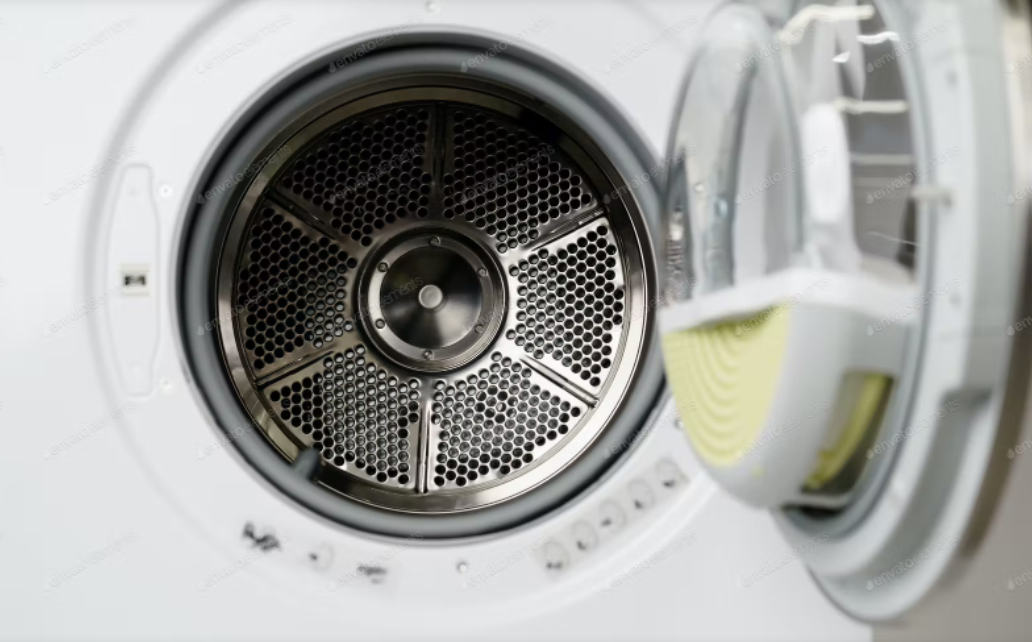
- Effectiveness – The whole purpose of a dryer is to get your clothes dry in a timely manner so it has to be effective.
- Safety – You don’t want fire hazards to arise from the use of your dryer.
- Cost – Energy efficiency and upfront costs should be as low as possible.
Is it OK to leave the dryer on overnight?
No. The lint could get too hot and combust.
What happens if clothes are in the dryer too long?
Mold and bacteria could grow if you don’t take your clothes out in a timely manner.
Why are my clothes wet after drying?
The most likely culprit is a clogged air vent.
Do electric dryers catch fire?
It’s possible. When hey run too long, they can overheat and cause a fire hazard.
How long should a dryer last?
In general, a good dryer should last between 10 and 13 years.
How big does a dryer need to be to dry a comforter?
You will need a dryer with a drum capacity of at least 7 cubic feet to dry a comforter.
How big a dryer do I need?
It will depend on the size of your family and what types of items you typically need to dry.
Final Thoughts
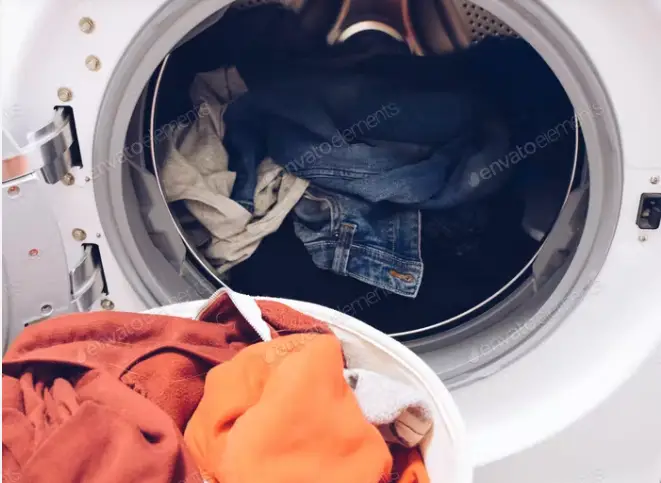
The right dryer could make a mundane chore much easier and save you time.
Carefully consider all of your options including the layout of your home and what kind of vent and utility hookup access you have. Then check out the types of dryers we outlined in the above guide!


